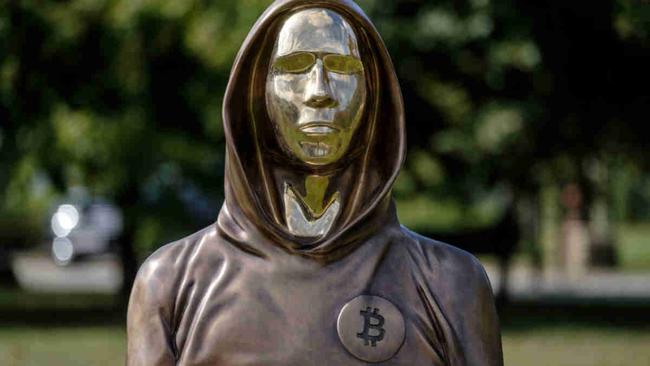The Ethical Investor: Aussies can now buy Bitcoin ETFs on the ASX, but how ‘ESG’ is Bitcoin really?
Is the VanEck Bitcoin ETF worth a look for Aussie investors? We evaluate through an ESG lens.

Stockhead
Don't miss out on the headlines from Stockhead. Followed categories will be added to My News.
ASX launched the VanEck Bitcoin ETF, marking the first Bitcoin ETF for Aussies
Is there a rationale for ethical investors to consider investing in this ETF?
And how ‘ESG’ is Bitcoin? We take a look
Aussie investors can now access a Bitcoin ETF on the ASX for the first time, following the launch of the VanEck Bitcoin ETF (ASX:VBTC) on the ASX on Thursday.
The ASX launch follows the debut of the first spot crypto ETFs in the US in January, which have quickly grown to total net assets of US$56.06 billion across 11 funds, surpassing initial expectations.
Hong Kong also introduced spot ETFs for Bitcoin and Ether in April, accumulating total net assets exceeding US$1.4 billion.
Sydney-based BetaShares and DigitalX, both local players, are also apparently preparing to debut their own Bitcoin ETFs on the ASX.
While it has been possible to trade Bitcoin via crypto exchanges in Australia, trading Bitcoin via an ETF on the ASX means Aussies are able to buy and sell them through a traditional brokerage account, simplifying the process.
But the recent emergence of spot Bitcoin ETFs has drawn attention from ethical investors who are concerned about the cryptocurrency's environmental impact.
One of the primary issues with Bitcoin's ESG credentials stems from its significant energy consumption during mining and transaction processing.
Even Tesla CEO Elon Musk, whose tweets usually move the crypto market, temporarily suspended the automaker’s acceptance of Bitcoin for purchases last year due to concerns about its impact on the environment.
So, is there a rationale for ethical investors to consider investing in Bitcoin ETFs, or should they avoid them altogether?
To address that question, we must begin by exploring how Bitcoin operates, starting with an explanation of what a blockchain is.
The blockchain
The pseudonymous Satoshi Nakamoto, in his white paper titled "Bitcoin: A Peer-to-Peer Electronic Cash System," outlined Bitcoin's primary purpose as a decentralised digital currency.
His intention was to create a system that would allow for peer-to-peer transactions without the need for intermediaries like banks or financial institutions.
At a very basic level then, a blockchain is a digital ledger that stores these transactions or data securely across a network of computers.
Rather than relying on a central authority, it leverages consensus among participants to validate transactions in that ledger; and once verified, data is stored in blocks linked together in a chain.
Each block contains a timestamp and a cryptographic hash of the previous block, creating a chronological and unalterable record. This structure makes it extremely difficult to tamper with past records without altering subsequent blocks, ensuring the integrity of the entire chain.
One key advantage of blockchain is therefore transparency. It provides a single source of truth that’s accessible to all participants in a network, ensuring everyone sees the same information.
Bitcoin mining, meanwhile, is the process of adding a block to the chain.
To add a block to the Bitcoin blockchain, miners must compete by solving complex math problems using powerful computers that consume a lot of electricity.
This process, called proof-of-work, involves guessing the correct answer first. As more miners join, the competition gets tougher.
Miners who successfully add a block earn a reward of 3.125 bitcoins as of now, following the last halving in April this year. That's worth around US$200k at today’s price.
This reward reduces by half (called halving) approximately every four years or every 210,000 blocks, which impacts the profitability for the miners.
Bitcoin as an energy guzzler
When Bitcoin was still at its infancy in 2009, mining one coin required the electricity equivalent of what a household typically uses in a few seconds.
But today, mining one Bitcoin requires as much energy as nine years of a household's electricity use.
Globally, Bitcoin mining consumes over 129 terawatt-hours annually, more than Finland’s total electricity usage. This represents nearly 0.5% of the world's electricity consumption and has increased tenfold in the last five years alone.
The massive energy use has drawn criticism due to its significant carbon footprint, challenging efforts toward a greener economy.
But Bitcoin’s biggest problem is perhaps not even its massive energy consumption, but the fact that most mining facilities are powered by fossil fuels.
A recent UN report found that Bitcoin mining relies heavily on an energy mix that includes approximately 45% coal and 21% natural gas.
Meanwhile hydropower, a renewable energy source known for its negative environmental and water-related effects, supplies more than 16% of the electricity used by the global Bitcoin mining network, said the UN.
Experts argue, however, that as the reward for Bitcoin miners decreases due to halving events, there is less immediate financial incentive for miners to continue mining.
Bitcoin also boasts big benefits for ethical investors
No matter how big those issues are, Bitcoin is here to stay.
So we believe that it's more important to explore how Bitcoin mining can play a role in moving towards a more sustainable economic future.
Looking at the social aspects, Bitcoin offers significant benefits such as providing access to banking services for the unbanked, particularly in developing and emerging economies.
Individuals without traditional bank accounts can use Bitcoin to transfer, receive, and store money securely and conveniently.
“It’s evident that banks have no incentives to solve the challenges faced by the unbanked,” said a report from FinExtra. “So it’s time that unbanked citizens help themselves by embracing crypto.”
Another often overlooked benefit of Bitcoin is, surprisingly, its potential to support and accelerate the global transition to renewable energies.
Bitcoin mining can serve as a technology that facilitates the generation and storage of clean energy by serving as a flexible energy buyer of last resort.
According to a recent report by Satoshi Energy Research, Bitcoin miners can function as a last resort buyer due to their ability to adjust electricity consumption based on market conditions and availability of renewable energy.
Right now, solar and wind energy output can be inconsistent, causing grid congestion issues even in developed countries with advanced grid systems.
So, during times when there is surplus renewable energy being generated, this excess energy could be utilised for Bitcoin mining operations, preventing it from going to waste.
So how ‘ESG’ is Bitcoin?
Crypto data firm CCData has just released its latest institutional-grade scoring system that evaluates digital assets focusing on ESG aspects.
The scoring system evaluated 40 of the largest, most liquid digital assets assessing metrics such as decentralisation, security and climate impact.
The points for each metric were aggregated and weighted for an overall score of maximum 100 points, making up the final grade from AA (best) and E (worst).
Ethereum has ranked highest in this year’s assessment (as well as in 2023), followed by Solana and Cardano. In contrast, Bitcoin received a ‘B’ rating primarily due to its significant energy consumption.
CCData says Ethereum's recent shift to proof-of-stake technology, which significantly reduced energy consumption, has earned it a AA rating.
| Rank | Asset | Environmental | Social | Governance | Total score | Final Grade |
|---|---|---|---|---|---|---|
| 1 | Ethereum | 25.3 | 28.5 | 24.1 | 77.9 | AA |
| 2 | Solana | 26.5 | 24.8 | 22.5 | 73.7 | AA |
| 3 | Polygon | 27.4 | 26.4 | 19.6 | 73.4 | AA |
| 4 | Aptos | 25 | 23.7 | 23.4 | 72.1 | AA |
| 5 | Polkadot | 27.4 | 18.3 | 23.6 | 69.3 | A |
| 6 | Stellar Lumens | 29.5 | 25.1 | 14.6 | 69.2 | A |
| 7 | Cardano | 26.3 | 21.1 | 21.5 | 68.9 | A |
| 8 | Binance Coin | 26.3 | 23.3 | 18.7 | 68.4 | A |
| 8 | Avalanche | 26.7 | 22.4 | 19.3 | 68.4 | A |
| 10 | Uniswap | 25.4 | 18.4 | 24.3 | 68.1 | A |
| 11 | Aave | 25 | 19.5 | 23.2 | 67.7 | A |
| 12 | XRP | 28.2 | 24 | 15 | 67.2 | A |
| 13 | Curve DAO Token | 25 | 18.2 | 22.8 | 66 | A |
| 14 | Dai | 26.3 | 15.5 | 23.5 | 65.4 | A |
| 15 | Algorand | 24.5 | 20.8 | 19.6 | 64.9 | BB |
| 16 | Arbitrum | 22.7 | 19.8 | 20.3 | 62.8 | BB |
| 17 | Mantle | 25 | 18.4 | 19.3 | 62.7 | BB |
| 18 | Decentraland | 25 | 16.7 | 20.7 | 62.4 | BB |
| 19 | Fantom | 22.7 | 18.3 | 21.3 | 62.3 | BB |
| 20 | Near | 23.7 | 18.7 | 19.7 | 62.1 | BB |
| 21 | Lido Dao | 25 | 15.2 | 21.6 | 61.8 | BB |
| 22 | Tron | 25 | 22.3 | 14.4 | 61.7 | BB |
| 23 | Cosmos | 23.6 | 18.6 | 19.4 | 61.6 | BB |
| 24 | Optimism | 22.7 | 17.8 | 20.3 | 60.8 | BB |
| 25 | Tezos | 24.1 | 19 | 16.3 | 59.5 | B |
| 26 | Internet Computer | 26 | 16.2 | 16.4 | 58.6 | B |
| 27 | EOS | 25 | 18.9 | 14.5 | 58.3 | B |
| 28 | Chainlink | 26.3 | 19.4 | 10.7 | 56.5 | B |
| 29 | Bitcoin | 7 | 28.7 | 19.4 | 55.1 | B |
| 30 | Tether | 25 | 21.6 | 7.1 | 53.7 | C |
| 31 | Filecoin | 15.2 | 15 | 23.5 | 53.7 | C |
| 32 | Circle | 26.3 | 19.9 | 5.1 | 51.3 | C |
| 33 | Shiba | 26.3 | 17 | 7.5 | 50.8 | C |
| 34 | Doge Coin | 9.8 | 22.2 | 16.5 | 48.5 | D |
| 35 | Litecoin | 7.8 | 22.2 | 16.1 | 46.1 | D |
| 36 | Bitcoin Cash | 9.2 | 20 | 16 | 45.2 | D |
| 37 | OKB Coin | 23.7 | 13 | 8.2 | 44.8 | E |
| 38 | BUSD | 26.3 | 11.7 | 5.1 | 43.2 | E |
| 39 | Ethereum Classic | 7.5 | 17.8 | 15.1 | 40.4 | E |
| 40 | Monero | 9.8 | 17.3 | 11.7 | 38.8 | E |
Source: CCData
This content first appeared on stockhead.com.au
SUBSCRIBE
Get the latest Stockhead news delivered free to your inbox. Click here
Originally published as The Ethical Investor: Aussies can now buy Bitcoin ETFs on the ASX, but how ‘ESG’ is Bitcoin really?


